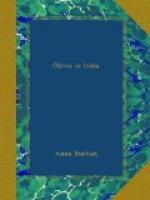Mrs. Gardner read a chapter from the Bible while we were there, and these women argued with her most intelligently. They are by no means stupid. Before we left G. sang to them, with no accompaniment but a cold stare. When she finished they said they preferred Bengali music, it had more tune. We left, feeling we had been no success.
Having seen a comparatively well-to-do household, Mrs. Gardner said she would show us a really poor one. We followed her through a network of lanes more evil-smelling than anything I ever imagined—London can’t compete with Calcutta in the way of odours—until we reached a little hovel with nothing in it but a string-bed, a few cooking-pots, and two women. Caste, it seems, has nothing to do with money, and these women, though as poor as it is possible to be, were thrice-born Brahmins, and received us with the most gracious, charming manners, inviting us to sit on the string-bed while they stood before us with meekly folded hands. The dim interior of the hut with its sun-bleached mud floor, the two gentle brown-eyed women with their saris and silver anklets, looking wonderingly at G. in her white dress sitting enthroned, with her blue eyes shining and her hair a halo, made an unforgettable picture of the East and the West.
We had tea at the Mission House and met several missionary ladies who told us much that was interesting about their work, which they seem to love whole-heartedly. I asked one girl how it compared with work among the poor at home, and she said, “Well, perhaps it is the sunshine, but here it is never sordid.” I can’t agree. To me the eternal sunshine makes it worse. At home, although the poverty and misery are terrible, still, I comfort myself, the poor have their cosy moments. In winter sometimes, when funds run to a decent fire and a kippered herring to make a savoury smell, a brown teapot on the hob and the children gathered in, they are as happy as possible for the time being; I have seen them. I can’t imagine any brightness in the lives of the women we saw.
To be a missionary in Calcutta, I think one would require to have an acute sense of humour and no sense of smell. Am I flippant? I don’t mean to be, because I feel I can’t sufficiently admire the men and women who are bearing the heat and burden of the day. And now that sounds patronizing, and Heaven knows I don’t mean to be that.
Anyway, G. and I were never intended to be missionaries. We drove home very silent, in the only vehicle procurable, a third-class tikka-gharry, feeling as if all the varied smells of the East were lying heavy on our chests. Once G. said gloomily, “How long does typhoid fever take to come out?” which made me laugh weakly most of the way home.
13th.
The day of our departure has come, and Boggley is behaving dreadfully. Having taken time by the forelock, I am packed and ready, but Boggley has done nothing. He remarked airily that I must go to the Stores and get some sheets, a new mosquito-net, and a supply of pots and pans, and then went off to lunch with someone at the Club, leaving me speechless with rage. How can I possibly know what sort of pots and pans are wanted? I never camped out before. I shall calmly finish this letter and pay no attention to his order.




